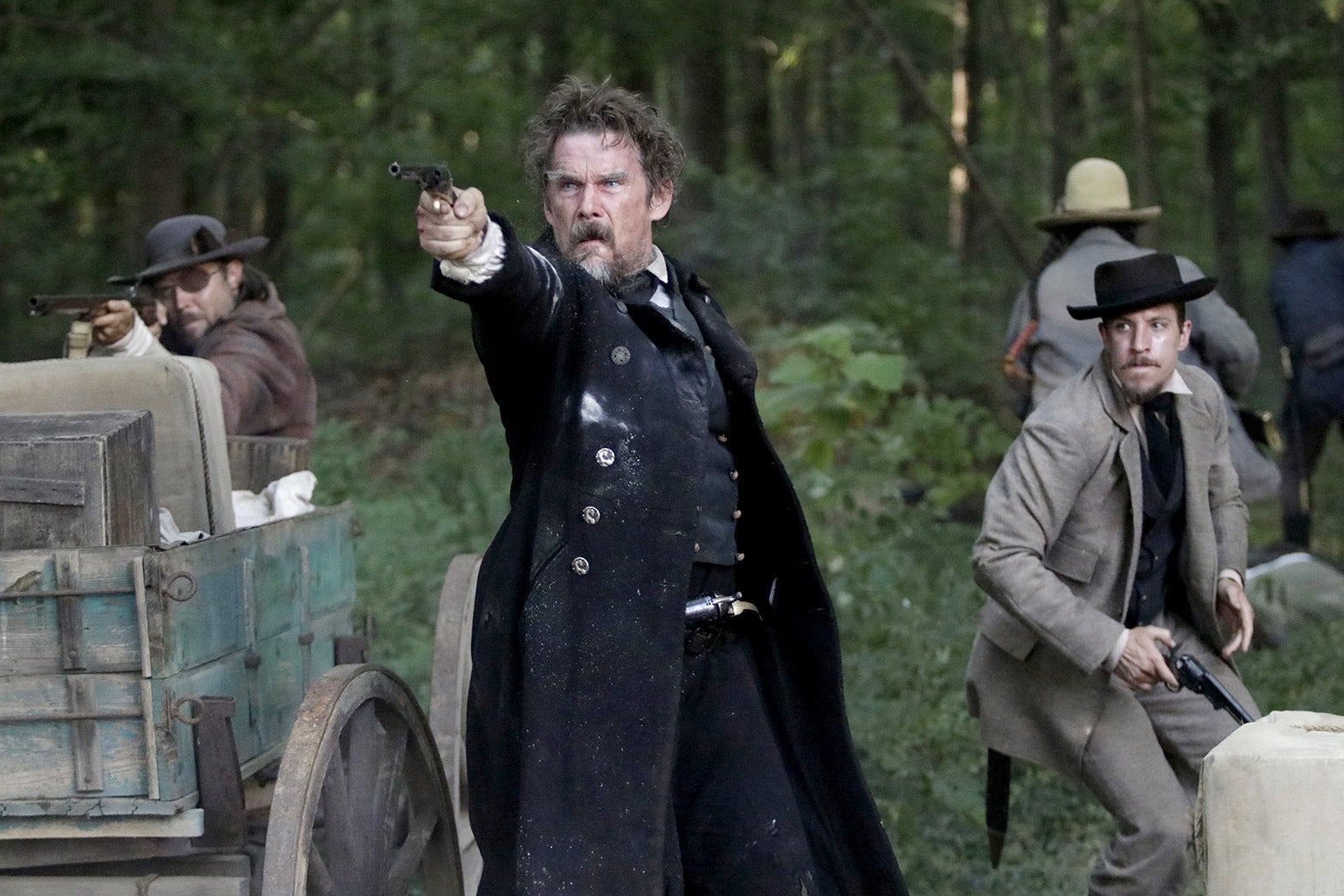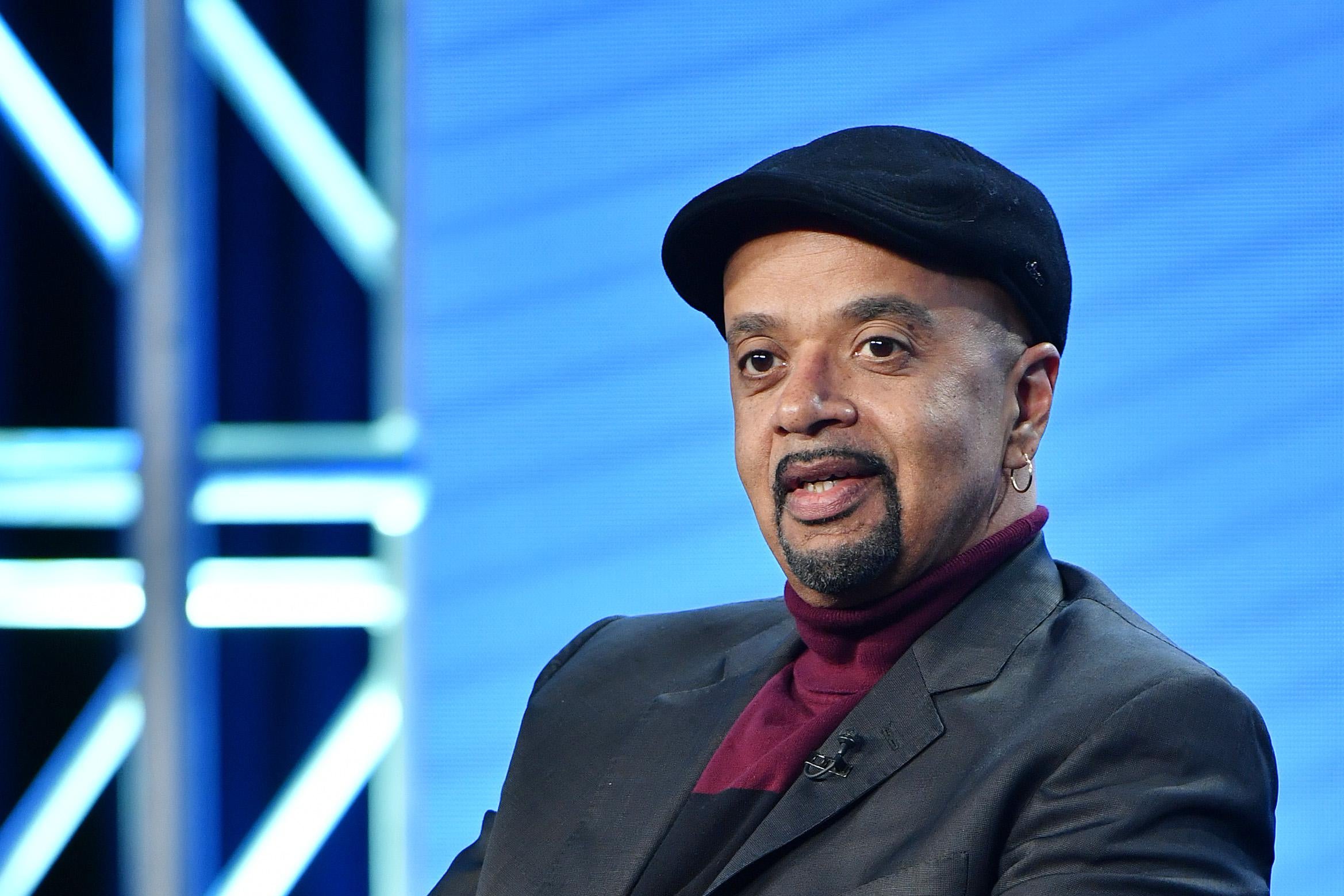 Ethan Hawke as John Brown in The Good Lord Bird. William Gray
Ethan Hawke as John Brown in The Good Lord Bird. William GrayThe Good Lord Bird and the Bloody Comedy of John Brown
It’s the rare adaptation that deepens and enriches the novel on which it’s based.
McBride’s obvious model for his novel is Huckleberry Finn; like Mark Twain, he creates an unsophisticated but perceptive child narrator, pairs him with an adult man of the opposite race, and sets the two on a journey that serves as the boy’s education. The humor often comes from the narrator’s straightforward and often unwitting observations of adult hypocrisy and self-delusion. In a scene taken from the novel, the series (created by Ethan Hawke, who plays Brown, and Mark Richard) shows Brown bringing young Henry Shackleford (whom he has rescued from enslavement and believes to be a girl) with him on a fundraising trip to the Northern states. Brown advises his young companion that he might be asked to recount the torments of bondage—whipping, starvation, deprivation. “Dutch ain’t never whipped me,” Henry (Joshua Caleb Johnson) earnestly tells the abolitionist of his onetime master, “and he fed me good. Never been cold before sleeping in the woods with you and the boys. And I ain’t never been shot at til I met you. Truth be told, I ain’t seen a person murdered til I met you.” The joke is that Henry has no idea how rhetorically inconvenient his individual truth is to the cause, but the scene also touches on an abiding theme of both novel and series: How much comfort does it take to persuade a person to abandon an uncomfortable principle?
Brown, portrayed with both mighty Old Testament majesty and tender humility by Hawke, is where all compromises go to die. As a member of Brown’s party, Henry (nicknamed Onion) witnesses the Pottawatomie massacre, in which Brown and his militia beheaded pro-slavery settlers. The similarity between those killings and the videotaped executions of Western captives by Islamist militants—more recent history in 2013 than it is today but still a vivid memory—runs like a shiver through the scene. The men Brown slaughters may be vile (just like Dutch, Henry’s former master, shows himself to be in the series’ initial scenes), but the blood and trauma that splash across Henry’s face as he looks on are also a truth.
Brown’s faith swings from the ridiculous to the sublime. His long-winded graces keep his famished ragtag followers from their dinners and he pauses midbattle to implore the Lord with prayers and quiz his sons on Bible verses. Religion saturated 19th-century America, yet few whites were rigorous enough to take their Christianity to the logical conclusion Brown arrived at: that slavery was an abomination to be eradicated at all costs. He had the courage of his convictions, sacrificing everything, including his own life, in that battle. On the other hand, as one of the abolitionist’s younger sons keeps pointing out, the bloodthirstiness of Brown’s crusade doesn’t seem exactly Christian, either. How much killing is a just cause entitled to? Who decides which causes are righteous enough?
At first, Henry regards Brown as mad and contemplates escaping the abolitionist’s “army”—in truth, a band of guerrillas not much bigger than the group recently charged with plotting to kidnap the governor of Michigan. At least then he could return to his former life, which was unfree but far less dangerous and included regular meals. The novel and series not only recount the years leading up to Brown’s doomed raid on the arsenal at Harpers Ferry, but also chart Henry’s evolution from a child primarily concerned with his own immediate needs to a committed follower of Brown’s. However, Henry’s is not really an ideological conversion; he’s too much of an everyman to be swept up in the riptide of an abstraction, even so pertinent an abstraction as freedom. When, in “gentle Canada,” Henry at last has the opportunity to strike out on his own, the collective fervor of an audience of free Blacks, rallied to serve in Brown’s militia by no less than Harriet Tubman, persuades him not to. But that’s only the last of many straws. The biggest—a veritable hay bale—is that he has come to love “the old man” like a father.
“Whatever he believed he believed,” is Henry’s much-quoted verdict on Brown in McBride’s book. “It didn’t matter to him whether it was really true or not. He just changed the truth till it fit him. He was a real white man.” It’s a beautifully double-edged blade of a line. Brown had the arrogance to regard himself as God’s instrument for liberating the slaves, and the confidence of privilege to believe that he could pull it off and remake the world to accord with the Lord’s will as he saw it. And despite the debacle at Harpers Ferry and Brown’s subsequent hanging, the raid did provide a crucial impetus to the Civil War by showing the South that white men were willing to die for abolition.
The Good Lord Bird is a swirl of moral equations that resists absolutism and can never be made to add up tidily. The series, by transcending Henry’s limited understanding of what’s going on around him, makes this even more evident. Its many fine performances indicate how, for example, each of Brown’s sons was motivated by a different mixture of filial love, righteous indignation, and exasperation with his father’s single-mindedness. McBride’s Brown is a hero, and he is also a kind of monster. Many people, including his own kin, die as a result of his stubborn insistence on going ahead with the raid, a conviction borne of the same zeal that makes him so impressive. But every lost soul is also registered in Hawke’s eyes.
By contrast, Frederick Douglass (Daveed Diggs), in a portrayal that will trouble some, is dismissed by Henry as a “speechifying parlor man,” who could never have brought himself to “fight a real war.” However, the raid on Harpers Ferry isn’t a “real war”; it is an ill-conceived and poorly executed boondoggle founded on Brown’s quixotic belief that enslaved people from the surrounding areas would rise up to join him and his men. (He would not be the last American radical with plans to trigger a race war.) Douglass correctly perceives this and refuses to participate. “You are a fanatic. I am a realist,” he tells Brown in the series. McBride’s Douglass is also self-important, keeps his white mistress in the house he shares with his Black wife, and spends all his time consorting in comfort with rich Northerners. Henry’s disdain notwithstanding, Douglass’ foibles don’t invalidate his greatness any more than Brown’s violent hubris cancels his. Sometimes the only way to balance accounts is with a shrug or laugh. Great men are still men, and none of those are perfect.



No comments:
Post a Comment